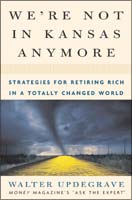Editor's note: The following is adapted from "We're not in Kansas anymore: Strategies for retiring rich in a totally changed world," by Walter Updegrave, senior editor at Money magazine.
When it comes to retirement planning, the phrase "We're not in Kansas anymore" sums up the situation most of us face. The days when we could rely on corporate benevolence and government largesse to support us in our Golden Years are gone.
Today, the responsibility for accumulating a nest egg and ensuring that it supports us throughout retirement has been placed squarely on our shoulders. This responsibility can be daunting, but it's also manageable if you approach retirement planning the correct way.
Here are 10 tips that can put you on the yellow brick road to a secure retirement.
1. Begin saving as early as you can -- but don't give up if you get a late start.
The sooner you begin saving, the more you can accumulate for retirement. Start saving $100 a month at age 30 and you'll have roughly $216,000 at 65, assuming an 8 percent annual return. Procrastinate till age 40, and you'll have just $91,000, or $125,000 less.
That said, even if you're in your 50's or 60's and have saved nothing, there are still moves you can make to build a decent nest egg. No matter how late you start, doing something is always better than doing nothing.
2. Create a retirement plan.
According the American Savings Education Council, Americans who have done a retirement calculation have nearly five times the savings of those who haven't bothered.
Whether you do it on paper or on computer, take the time to figure out how much income you'll need at retirement and then assess how much you must save regularly to hit that goal. (Get a rough estimate with this calculator.)
3. Get the most out of your 401(k).
Taking full advantage of the tax benefits and employer match in your 401(k) or other employer plan is key to a successful retirement strategy. Unfortunately, 20 percent of us who are eligible don't sign up for such plans, while many of the rest of us don't contribute the max or understand the investing choices. That's a big mistake, because the size of our 401(k) will largely determine our lifestyle in retirement. (See more on 401(k)s.)
4. Take advantage of other savings plans.
Chances are that no one plan alone will allow you to accumulate what you need for retirement. Which is why you should think in terms of multiple retirement savings plans, including IRAs, Roth IRAs, Simple IRAs, SEP-IRAs and Keoghs. The more you stash away in all the retirement savings plans you qualify for, the bigger your nest egg.
5. Invest with your head, not your gut.

| |
|
See more about the book.
|
|
In the roaring '90s, investors plowed their retirement savings into hot growth and tech stocks預nd then suffered during the meltdown. A better approach: Create a diversified portfolio of stocks and bonds that can thrive in upmarkets without getting obliterated in downturns. And while taxes shouldn't drive investing decisions, you should definitely factor the 2003 tax law's favorable treatment of dividends and capital gains into your investing strategy.
6. Take a retirement job.
Working in retirement may seem like an oxymoron, but AIG/SunAmerica's 2002 Re-Visioning Retirement survey found that 95 percent of preretirees expect to work in some capacity after retiring. One reason is financial: Income from a part-time job can make your retirement nest egg last longer. But working also offers emotional benefits, keeping us vital and engaged in life. Indeed, "rehire" is rapidly becoming a better term than "retire" to describe what many people plan to do after calling it a career.
7. Don't be afraid to improvise.
The yellow brick road to retirement can be tricky to navigate at times, what with unexpected expenses eroding our savings and bear markets mauling our 401(k)s. But there are always moves we can make to improve our situation: delaying retirement a few years, taking out a reverse mortgage, even relocating to an area with lower living expenses. The key to retirement success: Be resourceful and think adventurously.
8. Monitor your progress regularly.
A retirement plan isn't something you create and put on autopilot. To assure you stay on track, you should review your plan at least once a year, reassess your investing strategy as market conditions change, reevaluate your savings effort預nd make adjustments as necessary. After all, you don't want to find out at age 65 that your nest egg is woefully inadequate and that your only hope for a comfy retirement is throwing yourself on the mercy of a rich relative with a kind heart.
9. Plan an exit strategy.
Accumulating a tidy nest egg is only half the challenge of retirement planning葉he other half is transforming your investments into an income that will support you for the rest of your life.
That means setting a reasonable withdrawal rate from your retirement accounts, figuring out whether to pull money from tax-advantaged or taxable accounts first and deciding whether to include income vehicles like annuities in your portfolio. Your goal: Manage your assets so you don't run out of money before you run out of time.
10. Instill passion into your retirement planning.
The Tin Man accompanied Dorothy to Oz, because he wanted to ask the Wizard for a heart. In other words, he wanted not just to live life, but experience it with emotion and passion. You'll improve your chances of creating a retirement plan and following through with it if you, too, incorporate passion and emotion into your vision of retirement.
So give some thought to how you would like to spend your retirement years and what activities are likely to challenge and excite you. And when you finally do retire, pay attention to your finances, but don't obsess over them. Remember, you get only one retirement. So enjoy it while you can.

|